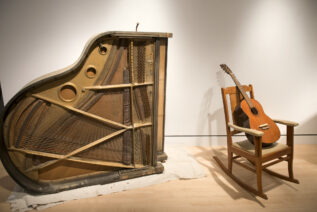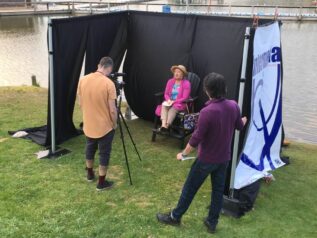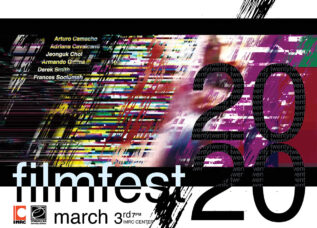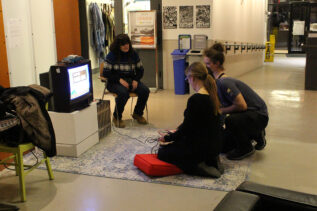Overview and Description of Course Sequence
The certificate course sequence totals 15 credits and is designed to be completed in one year (9-12 month). The curriculum for the Certificate is designed to provide an immersive exploration of focused creative and research work by the individual students. This is provided first and foremost through the design of the certificate as a small group cadre (up to 6-8) experience bringing together students from the medical fields and students from the arts and/or humanities to work on creative works in all medial and fields, and specifically implemented through Intermedia courses.
The certificate program is built around a year long special topics seminar on Arts and Humanities in Medicine (IMD 540 in both Fall and Spring) that will engage students in discussions, readings, presentations and projects around current and/or important topics in medicine, practices of health, and the value of an engagement in the arts and humanities for well being of both patients and practitioners. In addition to this seminar course the the certificate program will make use of the flexibility of the topics course structure of the Intermedia Programs as well as existing core courses of the Intermedia Program (IMD 500, IMD 570 and IMD 650).
In addition to the core creative work the focused year long seminar courses contains a central focus on issues of family medicine, existing and potential connections between the arts/humanities and medicine, a holistic approach to well being and quality of life (for both patient and practitioner) and will bring in a variety of participating scholars, artists, humanists and medical practitioners to work with students in the program.
The program will be capped/concluded with each student engaging in a process of research and creative production implemented through a final project that delves into some aspect of the arts/humanities and medicine.
The sequence of classes for the Certificate is a follows:
Fall (6 credits)-
IMD 500 Creative Concept development
IMD 540 – Topics of Intermedia history/ theory, Core Seminar, 3 credits
Spring (6 credits)
IMD 540 – Topics of Intermedia history/ theory, Core Seminar, 3 credits
IMD 570 – Intermedia Studio Critique I
Summer (3 credits)
IMD 650 – Field Study and Research, Final project, 3 credits
Course Descriptions
IMD 500 Creative Concept development, 3 credits (five week summer class)– special version of the course that combines aspects of IMD 500/creativity, 501/theories of Intermedia and 560 Art/research and world formation.
Course Catalog Description: This course is intended to provide an in depth introduction to the theory and practice of critical thinking and creative practices that facilitate innovation and model processes that are central to creative fields in general and Intermedia in specific. Emphasis will be placed on: the conceptual and interdisciplinary nature of innovative and creative practices; an awareness of perspectives drawn from traditional creative fields, such as the arts, as well as from non-traditional forms and practices of innovation; and a focus on each individual student building a creative praxis model for their own research, development and innovative production.
IMD 570 – Intermedia Studio Critique I, 3 credits – individualized work, interaction with students/program and feedback on work
Course Catalog Description: Intended to provide an environment for guided independent art/research/production in intermedia. Emphasis placed on the conceptual and interdisciplinary nature of this art form, awareness and manipulation of traditional art boundaries, and the exploration of non-traditional art media. This is an advanced graduate-level studio course emphasizing independent levels of work, theoretical engagement in the creative process and an ongoing commitment to individual studio praxis.
IMD 540 – Topics of Intermedia history/ theory, Seminar in Arts and Humanities in Medicine, 3 credits (required for two semesters)
Course Catalog Description: This class will cover diverse, topical considerations of historical forms of Intermedia and related directions, such as Futurism, concrete poetry, installation, artists’ books and multiples, Fluxus, sound art and environmental art. Although topics will vary from semester to semester all iterations will focus on giving students an in-depth exposure to historical periods or theoretical aspects of arts creation related to Intermedial forms. In addition to the historical subjects, these classes will consider a variety of related production, practical and process explorations that will help form the basis of a praxis model for Intermedia production.
Specific topic description for core seminars
Through this seminar series students coming from the medical fields and the arts and humanities will interact to discover what each other does and how to collaborate. Students will explore weekly topics on subjects related to health and well-being and the role/function of the arts in such endeavors. Students will attend talks by visiting artists, scholars and medical practioners, develop creative projects, discuss assigned readings, and explore ideas that address the pressing needs of our healthcare system, clinical roles for artists and humanitarians, and the role of the arts and humanities for the lives and practice of doctors and clinicians.
IMD 650 – Field Study and Research, 3 credits – This course will be used for students final project research and production.
Course Catalog Description: General or topical course for credit that can be used for work in another field or study abroad when no other credit options are available. This can cover work in a professional area or field, internships, study at another approved institution for which credits are not available through other means, or other such work for the Field Research requirement of the MFA degree.
Access and distance based delivery of classes
The certificate program is designed as a hybrid, with aspects of both remote and in person experiences. Distance education technology will be used to facilitate course delivery, media presentations, visiting scholars and artists, and other materials as needed. The program is designed to be both fully available online and in person depending on the student’s needs. The online version of the program is specifically designed as a way to expand the potential of utilizing distance technology to broaden the geographic reach of this unique course of study.

A doctor cannot be a scientist; he is either, like the surgeon, a craftsman, or, like the physician and the psychologist, an artist. This means that in order to be a good doctor a man must also have a good character, that is to say, whatever weaknesses and foibles he may have, he must love his fellow human beings in the concrete and desire their good before his own. W.H. Auden





